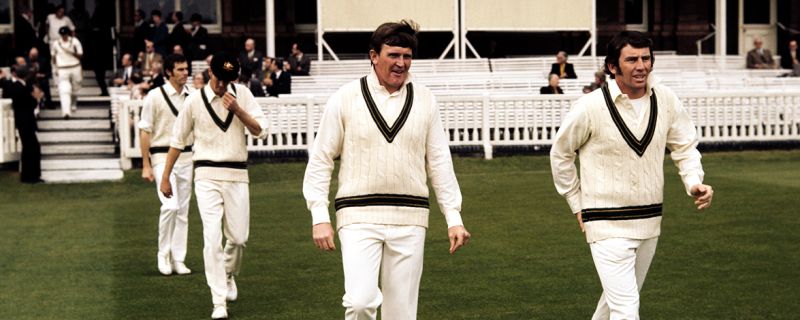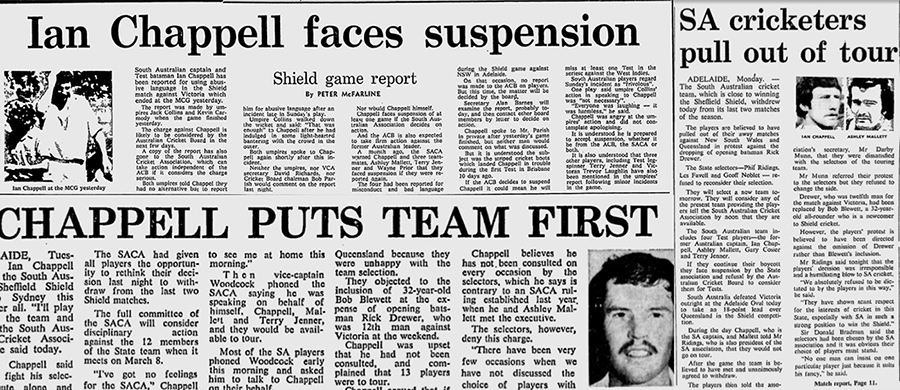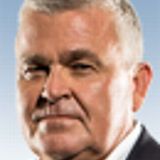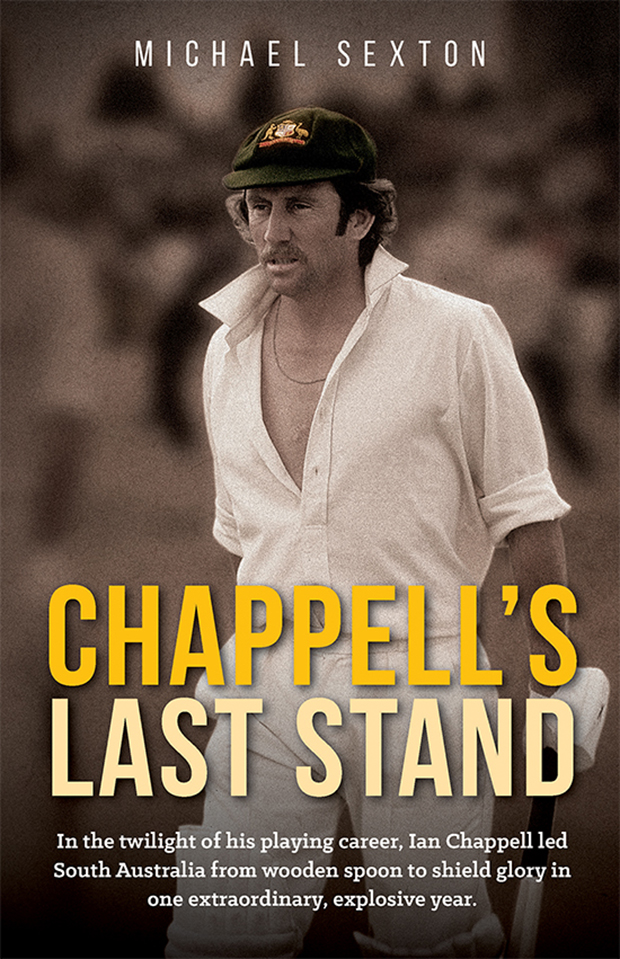The most badass skipper ever
 Ian Chappell leads his team out PA Photos/Getty Images
Ian Chappell leads his team out PA Photos/Getty Images


 Ian Chappell leads his team out PA Photos/Getty Images
Ian Chappell leads his team out PA Photos/Getty Images

Replies sorted oldest to newest
For those growing up in Adelaide during the 1960s and '70s, Ian Chappell was the most captivating sporting attraction in the months when you impatiently waited for the next footy season to begin.
South Australia is AFL-obsessed. Cricket season is when Croweaters catch their breath. That was not the case when Chappell led the South Australia Sheffield Shield team. Due to his charisma and combative nature, the frenzy often continued deep into spring, summer, autumn even, as he made the state team obligatory viewing. You were drawn to all that swagger.
Under the guise of going to the State Library for supposed after-school study, I would often get off two bus stops early and veer left towards the Torrens.
As long as the ground attendants had remembered to open the Victor Richardson Gates for the final Shield session, you could happily sit in front of the world's best scoreboard and enjoy the best free entertainment in town.
Sadly, I had moved to another state by the time of Chappell's inspired season of tough-love leadership that saw South Australia win the 1975-76 Shield title. But every moment was avidly followed on a middle-of-nowhere farm via the endless glaring newspaper headlines and articles that he generated during a season rated by Geoff Armstrong, in his history of the Sheffield Shield, A Century of Summers, as the competition's "most controversial".
This was the season where Chappell took on everyone, particularly the South Australian administration. This was the season when he transformed a team that had finished last in the previous two seasons into title-holders. This was also when Chappell's team went on strike.
Michael Sexton focuses on that simmering summer in Chappell's Last Stand and on how Chappell, in what was supposed to be his final year as a player, rallied a diverse group of personalities, including Terry Jenner, Ashley Mallett, Rick Darling, Gary Cosier, Ashley Woodcock, Wayne Prior, Rick Drewer, Barry Curtin, Geoff Attenborough, Rodney Hogg, Dennis Yagmich and a bright, brash David Hookes into believing they could and would dominate.
Chappell's captaincy achievements are many, but he believes that season was his most satisfying. As he told Sexton: "It is probably the thing I am most proud of as a captain - that we went from last to first and won the Shield."
It also had something to do with putting cricket's dithering hierarchy in its place.
The season began in R-rated fashion when Chappell's posterior appeared in newspapers around Australia. With his pants around his ankles, he was photographed adjusting his protective gear while batting against NSW in Adelaide. Then angered that NSW captain Doug Walters would not declare, Chappell in protest bowled an over of full tosses. The umpires cited five players, including Chappell, for unruly behaviour.
At the inquiry, former state captain and then South Australian Cricket Association president Phil Ridings asked why he persisted in bowling full tosses. When Chappell explained his reasoning in trying to revitalise the game, Ridings asked what difference it made between being 46 runs behind or 150 behind.
"Chappell exploded: 'If you don't know the difference then you don't know much about cricket.'"
Chappell told Ridings and Co that he "had had a gutful of what had been going on for the past two years". "Why are you so angry about it? I finished last nine times," Ridings said. "That is the f*****g difference between you and me, Phil: I'm not going to finish last nine years in a row.'"
The friction lingered for the rest of the season, fuelled by a threatened suspension after umpires complained about Chappell's behaviour during South Australia's win over Victoria in Melbourne. On returning to Adelaide, he told journalist Mike Coward at the airport: "I don't have any loyalty to the SACA anymore but I am loyal to the SA players who are trying so desperately hard at the moment to win the Shield."
Chappell was as infuriated with how poorly the SACA treated its players. He would point out that "the barman at the Adelaide Oval was getting $25 per day while the players were getting half that, plus a longneck and a carton of Benson and Hedges".
Then during the Adelaide match against Victoria, the ground announcer listed the 13 names of the touring party to play Queensland and NSW in the final two matches. It included Bob Blewett, while Drewer had been omitted.

Chappell "had no gripes" about Blewett being picked, but thought dropping Drewer ridiculous and a 13th player unnecessary. The selectors had also breached an agreement where they would notify him in advance of any team changes.
A seething Chappell asked Ridings why he hadn't been consulted. The skipper was told he couldn't be contacted as he was batting at the time.
"I thought that was my f*****g job," Chappell shouted down the phone. He then quit. He first told Mallett he wasn't going to Sydney and Brisbane. "If you are not going then I am not going," Mallett said.
Jenner backed Chappell and Mallett, but wanted to take it further. Jenner called a team meeting. While Chappell said it was a personal decision, Jenner disagreed, arguing "If it was good enough for the captain not to go on tour then it is good enough for the rest of the team."
A secret ballot was organised. The vote was 8-2 in support of their captain - with Cosier and Hogg against striking. Jenner said it couldn't be a split result. It was either all in or all out. Another vote was taken - and this time it was unanimous. The next day the local papers ran mug shots of the 12 players over a headline: "State cricketers quit."
The standoff only ended when one of South Australia's most illustrious, rough and tough footballers, Neil "The King" Kerley, telephoned Chappell, urging him to play.
Shortly after, Chappell and his men headed east to secure the Shield.
Chappell's Last Stand recalls how the "revolt" was not forgotten by some long-standing foes. Sir Donald Bradman, in a letter to EW Swanton, explained that "the young players in the SA team were brainwashed by Chappell".
Chappell counters that with: "Bradman pisses me off. If he was still alive I would tell him there are other ways to get players to play for you than brainwash them. [That] might have been his way but it wasn't mine."
"That statement I made after the Victoria game, that I wasn't playing for the SACA anymore and that I was just playing for the team Apparently that really got up the administrators' noses. So I am really glad I made it."
That's why numerous South Australians of my vintage will forever regard IM Chappell as their favourite cricketer. As Chappell's Last Stand reminds us, he stood, defied and delivered.
Chappell's Last Stand
By Michael Sexton
Affirm Press
Access to this requires a premium membership.